Ways to Remove Stubborn Essential Oil Stains from Clothing

Do you want to know how to get essential oils out of clothes? You may think that the oil stains are the most difficult type of oil to remove on fabrics; for instance, eliminating lipstick stains out of the rug may be the hardest thing ever! Relax, it is not that complicated if you know the way!
But what are the best methods to treat essential oil stains on clothing items? Here in this post, I will share with you everything you want to know about this topic! So stay tuned for more!
What’s In Essential Oils And Can It Stain Clothes?
Unfortunately, the answer is yes. The essential oils can stain your clothes without you noticing when you accidentally drop some of them on your T-shirt. But the good news is, you can totally treat the stains with some proper methods!
Want to know what is inside the essential oil? It is literally the scent of a plant. The makers use cold-press techniques to take the extract from plant compounds, thereby creating many versions of essential oils with different aromas, such as sandalwood, rose, jasmine, lavender, peppermint, etc.
Besides being used in making cosmetics, essential oils can also be seen in many cleaning products such as hand soap or laundry detergent. It can also be used to make scented candles. You can wash the laundry with some drops of essential oil for a better lingering smell. (1)
The grease stains like vaseline is also a complex stain to remove on clothes. Vaseline is a great substance for many purposes, but it is also very difficult to remove vaseline from clothing items perfectly. The essential oil is somehow like that, but it is a bit easier to treat!
Don’t worry, I will show you the most precise methods in getting rid of essential oils on garments!
Before You Start, Pretreat The Essential Oil Stain First!
Before taking any treatment for the stained clothes, acting quickly is the key! For example, you should use a blunt item to scrape away the excess curry before you want to completely get rid of the yellow curry stains on your garments. Just make sure that you act as quickly as you can!
Preparation:
- Paper towel(s)/ A clean cloth
- Washing machine (optional)
Step 1: Remove The Excess Oil
If you accidentally drop some essential oils on your T-shirt or pants, you should use a clean cloth or paper towel to blot on the stained area as fast and as much as possible.
Step 2: Sandwich The Stained Part
When you have done absorbing the excess oil, sandwich the stain with another two pieces of paper towels and use your hands to press them gently together.
Step 3 (Optional): Wash The Stained Clothing
Then, you can bring the clothes to wash in the washing machine with the hottest water temperature that your clothes can withstand (you should always check the label first) before treating them with further methods and cleaning agents.
However, do not put the laundry in a dryer because it may set the stain forever on your clothing.
10 Best Methods To Say Goodbye With Essential Oil On Clothes
Here are the most effective methods to get the essential oils off your clothing items. Some of the detergent suggestions are very common and easy to use. Let’s see what they are and how you can use them as a treatment for your stained clothes!
1. Paper Towel
If it’s just some tiny drops on your clothing items, it’s fine to only use paper towels to blot them in order to absorb the oil and quickly remove them from fabrics. All you need to prepare is clean paper towels.

Step 1: Blot The Stain
Swiftly blot the oil with a paper towel. Try to eliminate the excess as much as possible at this step.
Step 2: Place More Paper Towels
After that, grab some new paper towels and put some sheets of them on the stained area. Let them be like that for about a few hours.
If the paper towels start to soak in the oil, it’s working! You may want to replace new pieces if needed.
2. Rubbing Alcohol
Rubbing alcohol is a common detergent to use in cleaning stains and smell on clothing. The fruit stain on clothes is also a type of stain that can be removed with rubbing alcohol, such as getting the blueberry stains off the garment. Let’s see what you can do with rubbing alcohol in this case!

Preparation:
- 70% rubbing alcohol
- A clean rag/ A sponge
- Bar soap
- Hot water
- Gloves
Step 1: Put On The Gloves
You should always wear gloves when dealing with rubbing alcohol because it is a chemical substance that can burn the skin. So remember to protect your hands with gloves before you start!
Step 2: Apply The Rubbing Alcohol
Wet a clean rag or a sponge with some rubbing alcohol, then gently rub it on the stained area of the clothes. Make sure that the area is well-soaked before getting to the next steps.
After that, let the rubbing alcohol stay on the garment for about 5 minutes.
Step 3: Apply Bar Soap
Use the bar soap to directly apply to the stained part. Rub it until the soap turns soapy.
Step 4: Rinse With Hot Water
Rinse your treated clothes with hot water in order to melt the residue oil stain on the clothes.
3. Baking Soda
Baking soda is used in cooking and is the best household cleaning powder ever! It is also a great smell-absorbent that can take away the bad smell such as eliminating the thrift store smell on second-hand clothes. Fortunately, this powder can also treat the oil stain on fabric!

Preparation:
- Baking soda
- Spray bottle
- Hot water
- An old toothbrush
Step 1: Wet The Stained Spot
Remember to pretreat the oil stain as fast as possible. After that, pour the hot water inside the spray bottle and apply it to the stained area. You should wet through the area.
Step 2: Prepare The Paste
Make a thick baking soda paste by pouring a little bit of water into some baking soda. The paste should look like toothpaste.
Step 3: Apply The Paste
Use an old toothbrush to apply the prepared paste to the stain. Gently scrub it with the toothbrush. Leave the paste to sit on the fabric for about 1 hour.
Step 4: Rinse The Stained Area
Use hot water to rinse the paste away. Then, check closely to observe the stained spot. If it doesn’t work really well, you may want to use other detergents and methods to treat the stains.
Note: This method is the most effective when applying for wet and old oil stains. It is also a great method to treat bad-odor clothing.
4. Gel Stain Remover
Gel stain remover sticks such as OxiClean are another great cleaning detergent to get the stains off your clothes. This method can also be used to replace the baking soda in the previous treatment.

Preparation:
- Gel stain remover (OxiClean, etc.)
- Regular laundry detergent
Step 1: Apply Stain Remover
Apply the gel on the stained part, then gently press and rub into the fibers. Leave it there for about 5 – 30 minutes. The time duration may vary based on whether the oil stains heavily on your clothes or not.
Note: You may treat the clothes up to a week before getting the clothes to wash.
Step 2: Wash As Usual
Bring your pretreated garments to wash with regular laundry detergent. Set the machine to the hotter water temperature that your clothing items can withstand. Make sure always to check the care label beforehand.
You can also treat any oil or grease stains on fabrics with spray stain remover!
5. Dishwashing Detergent
Dishwashing detergent, or dish soap, may appear in everyone’s house! It can also be one of the best liquid solvents ever for grease stains like essential oil ones on garments since it dissolves the grease particles! What can be better than utilizing the dish soap right in your house?

Preparation:
- Liquid dishwashing detergent
- A soft-bristled toothbrush/ A clean rag/ A sponge
- Warm water
- Bleach (optional for white or light-colored garments)
Step 1: Apply The Detergent
After pretreating the stained area, pour some drops of dishwashing detergent directly on it. Then, use the item you have to brush or rub the liquid gently on the clothes.
Step 2: Rinse The Stain
Use warm water to rinse the treated part and check the stain to see whether it has gone or not. If the oil stain is still obviously there, try the next step.
Step 3: Use Dish Soap Solution
Combine 2 tablespoons of dish soap with 1 gallon of warm water. After that, soak the whole affected clothing item in the solution for about 20 minutes.
If your clothes are in white, light colors or bleach-safe, you may want to use some bleach to treat the essential oil stain for a better result.
Step 4: Adapt The Soap Again
Take the soaked garments out, apply some dishwashing soap on the stained area, and then rinse them again.
Note: This can also be used to pretreat some old and stubborn essential oil stain on clothes.
Then, you can apply other methods like rubbing alcohol for complete removal.
6. Baby Powder
If you happen to have baby powder in your house, especially when you have children, you can also use it as a home remedy for absorbing the oil stains. This is the safest cleaning product you may use since it can be applied to a baby’s skin.

Preparation:
- Baby powder
- A small dish (optional)
- Cotton ball/ A sponge
- A container (sink, bathtub, etc.)
- Dish soap (optional)
- An old toothbrush (optional)
Step 1: Apply The Baby Powder
Don’t forget to blot the oil stain first! Then, hold the baby powder bottle and shake it hard to get a handful of powder. You can pour it on a tiny dish or directly on your hand.
Step 2: Dab On The Stain
Use a cotton ball or a sponge to dab gently over the stained area in order to make a nice powder coat outside. Then, leave the powder there for about 5 minutes.
Step 3: Shake The Powder Off
After that, get rid of the powder by shaking the garments well. Remember to shake over the sink or bathtub so that the powder won’t fall out too much on the floor.
The stain should be gone by now, but repeat the method or try another one if it does not.
Step 4 (Optional): Use Dish Soap
Combine dish soap and water in a 1:4 ratio. Then, submerge the stained part treated with baby powder into this solution. Wait for about half an hour. Brush the solution away and rinse the stained area under running water.
If you want a stronger method with baby powder, try to apply dish soap solution on the stain.
7. Eucalyptus Oil
Eucalyptus oil is a natural detergent that is more useful and handy than you imagine! Using another oil to treat essential oil stains may sound weird, but it actually works! Eucalyptus oil consists of cineole or eucalyptol that can dissolve grease stains. (2)

Preparation:
- Eucalyptus oil
- A bucket (Optional)
- Hot water
Step 1: Apply The Eucalyptus Oil
After getting the clothes for pretreatment, pour 5 to 10 drops of eucalyptus oil directly on the stained spot. Leave it there for about 15 minutes.
Step 2: Rinse The Clothes
Then, bring your garments to wash and then observe the stain to see if it has gone or not.
Step 3 (Option): Soak In Eucalyptus Oil Solution
For a sizable and more stubborn stain, you may try this way. Pour the hot water inside the bucket and add 1-2 eucalyptus oil capfuls.
After that, submerge all of the affected clothes in the solution for about one hour.
Tip: You can also add eucalyptus oil to the wash!
8. Murphy’s Oil Soap
This detergent may sound old-fashioned to some of you, but it is actually very efficient in treating these kinds of grease stains on garments!

Preparation:
- Murphy’s oil soap
- A spray bottle
- Water
Step 1: Wet Your Stained Clothing
When you have finished pretreating the stain, damp the clothes using the spray bottle. You may also soak the item in plain water and wring it to get rid of the excess water.
Step 2: Apply Murphy’s Oil Soap
Pour a teaspoon of Murphy’s oil soap on the stained part. Use your fingers to rub on the stain to make a paste on the fabric. Then, just let it sit there for about 1 hour.
Step 3: Wash The Garments
Bring the treated clothes to the washing machine and wash them as usual. You may want to add a little bit of Murphy’s oil soap in the wash.
Air-dry the laundry. If you want to use the dryer, make sure that the stain has gone completely!
9. Coke
Coca-Cola, or Coke, is definitely one of the most favorite beverages of all time! You may be surprised to know that Coke is used to drink and treat the oil stains on clothing items! How cool is that?
Coke is a type of soda consisting of phosphoric and carbonic acid. These substances can dissolve the oil particles pretty well; that’s why Coke can be used to eliminate the pesky oil stains on the fabric. It is also safe to use a large amount of Coke to treat the stain.

Preparation:
- A can (or more) of Coca-Cola
- Regular laundry detergent
Step 1: Pretreat The Stained Area
You may want to pretreat the oil stain by scraping off the oil as much as possible. Then, you can apply my suggested home remedies for better pretreatment.
Step 2: Add Coke To The Wash
Bring all the treated garments to the washing machine, then pour a whole can of Coke into the wash, together with the regular laundry detergent as usual.
Note: It is okay to use Diet Coke instead of Original Coke.
10. Combination: Baking Soda, Dish Soap, And Vinegar
This is a great combination of cleaning detergents that can be the most powerful method among all of the above ones.

Preparation:
- A clean rag/ Paper towel
- An old toothbrush
- Baking soda
- Dishwashing soap
- Vinegar
Step 1: Apply Baking Soda
After applying the pretreatment, place enough baking soda on the stained spot. Rub it with an old soft-bristle toothbrush for about an hour.
The baking soda will be an absorbent agent to take away all the oil residue on the stain. You may observe that the powder turns into a yellow-brown stain.
Step 2: Remove The Discolored Stain
When the stain turns into yellow-brown pieces, use a blunt item such as a butter knife to take them off and repeat the process from step 2. You can stop when the baking soda no longer absorbs the stain.
Step 3: Apply Dish Soap
Pour some drops of dish soap directly into the stain. Then, wash the stain with some water until the dish soap becomes a paste.
Use another dry toothbrush to brush the substance on the stained clothes. It will be better if you turn the clothes inside out and do it on the other side of the fabric.
Step 4: Wash The Treated Clothes With Hot Water
Bring the whole garments to wash at the hottest water temperature that your clothing items can withstand. Wash with some regular laundry detergent and 1/2 cup of white vinegar. Hot water is vital because it helps melt the oil residue on your clothing.
Step 5: Air Dry Your Clothes
After washing, hang your washed clothes to dry them out. Avoid using the dryer because the oil stain may set more on your clothes.
Check the stain after it is scorched. If the stain is still there, you may want to rewash your clothes.
Note: You can also replace dish soap with eucalyptus oil in step 3! Apply the oil onto the stain then wait for half an hour and rinse it off. Do it over again until the stain is not there anymore. Then continue with the following steps.
4 Effective Ways To Eliminate Old Dried Oil Stains On Clothes
The old stains are always more complicated to treat than the new fresh stains! However, when there’s a will, there’s a way! If you really want to get those pesky essential oil stains out of your garments, here’s basically how!
1. Oxygen Bleach
Oxygen bleach is a color-safe bleach for most of the fabric types. You may want to use it to deal with dry oil stains.

Preparation:
- Oxygen bleach
- Regular laundry detergent
Step 1: Pretreat The Stain
Pretreat the oil spill on your clothes like other methods. You can use any blunt item available in your house to get rid of the oil excess.
Step 2: Wash Clothing With Bleach
Wash your stained clothing as you would normally do with laundry detergent, but this time, add an appropriate amount of oxygen bleach to the wash.
Note: Avoid using chlorine bleach because it is only used for specific clothing types such as white items.
2. WD-40 Spray
You can also use WD-40 spray to treat more stubborn stains! It is a commercial stain remover that can quickly help you get rid of many types of stains on clothes.

Preparation:
- WD-40 spray
- Hot water
- Liquid detergent
- Baking soda (optional)
- An old toothbrush (optional)
Step 1: Apply WD-40 Spray
Apply WD-40 onto the stain, then wait for at least 30 minutes. Then, rinse the stain with hot water.
Step 2 (Optional): Apply Baking Soda
Make a thick cover of baking soda on the oil stain and use an old toothbrush to adapt the powder. Dab on the stain gently with the toothbrush. Repeat this step if needed.
Step 3: Spot Treat With Detergent
Treat the stained spot with some heavy-duty liquid detergent and wait for 30 minutes.
Step 4: Wash The Treated Clothes
Bring the clothes to wash with the hottest water possible. Remember to check the care tag on each piece of your clothing first to determine the water temperature.
See how you can treat the oil stained clothes step-by-step with WD-40!
3. Murphy’s Soap
Another effective method to use is Murphy’s Soap. It has long been the multi-purpose soap that is useful in cleaning and treating many stains.

Step 1: Apply The Soap
Don’t forget to pretreat the stain first. Then, place a little of it on the stain, then scrub it well. Leave the soap there for a few hours.
Step 2: Wash As Usual
Like former treatments, bring all clothes to wash as normal. You may want to set the highest water temperature setting to completely remove the oil stains.
4. Baking Soda Paste
You should use the baking soda paste for very dried and stubborn oil stains. It is also a safe and powerful way to get rid of the pesky stain.

Preparation:
- Baking soda
- Water
- Vinegar
- Laundry detergent
- Spray bottle
- An old toothbrush
Step 1: Apply The Paste
Make the paste with baking soda and a bit of water in a 3:1 ratio. Apply the paste on the stained spot, then allow it to sit on the fabric for a day (up to 24 hours).
Step 2: Spray Vinegar
After that, spray some vinegar on the stain, then scrub some laundry detergent with an old soft-bristle brush.
Step 3: Wash The Clothes
Bring the garments to wash like other methods. Remember to check the care label and set the hottest water possible for your laundry.
Prevent The Essential Oil Stain On Your Garments
Actually, essential oils are the best natural perfume substitute. Here are some methods to help you avoid the essential oil stain on clothes while using the oil or any oil product such as cosmetics.
- Dilute the essential oils with water before using them. Then, use the spray to apply the essential oil anywhere on your clothing items. This also reduces the chance of getting your skin itchy with the original extract.
- Avoid using some dark-colored types of essential oils that are likely to stain your clothes, such as jasmine, vetiver, myrrh, tangerine, blue tansy, German chamomile, etc.
- Make use of an essential oil diffuser. When you use the diffuser, you don’t have to worry about the oil stains on your clothes.
- If you are going for a massage, make sure that the essential oil completely absorbs your skin before putting on the garments.
- Always put the lid of the essential oil bottle on after using it! If you leave the bottle open, the oil may have a higher chance of getting spilled.
- Wear an apron when dealing with essential oils to minimize the damage they probably make on your clothes.
- Place the oil bottle somewhere hidden so that they won’t get knocked over easily. You may want to store them in a cupboard or a small box in your vanity.
With these simple and helpful tips, you can minimize the risk of getting unexpected essential oil stains on your clothing!
FAQs
Here comes the Q&A section! I guess that there are many more questions about this topic, so read through this section to see whether your concern is lying here or not. Here I will solve some of the most commonly asked questions.
How Is The Result After Applying Those Methods?
Tell me your feelings below this post if you have used one of my suggestions! Does it actually work on your stained clothes? I hope that it has worked well when treating the pesky essential oil stains on your favorite T-shirt!
For further questions, concerns or sharings, please also get to the comment sections and leave me some comments! I love to hear your stories! Don’t forget to like, share and subscribe to the newsletter to achieve the latest articles! Hope to see you soon, pal!

References
- Cleveland Clinic. 2021. 11 Essential Oils: Their Benefits and How To Use Them.
- En.wikipedia.org. 2021. Eucalyptus oil – Wikipedia.

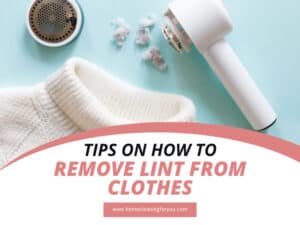
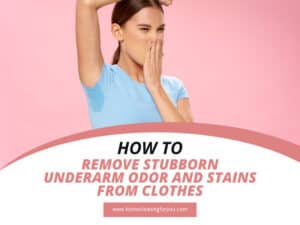

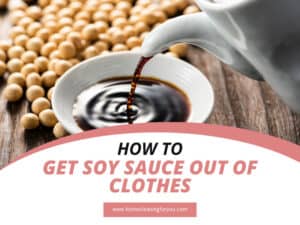
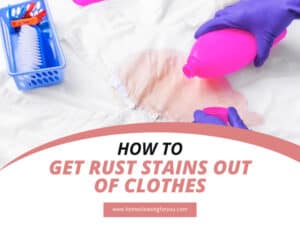
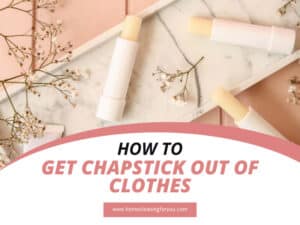
Samantha Lee
Head Cleaning Expert
Expertise
Professional Home Cleaning, Green Cleaning Techniques, Stain Removal & Fabric Care, DIY Home Maintenance & Organization, Sustainable Cleaning Products, Home Care for Busy Lifestyles
Education
University of Denver
Samantha Lee is the Head Cleaning Expert at HomeCleaningForYou.com, specializing in eco-friendly home care. She holds a Bachelor of Science in Environmental Science from the University of Denver, focusing on sustainable cleaning solutions.
With expertise in green cleaning, stain removal, and DIY home maintenance, she helps homeowners keep their spaces fresh and chemical-free. Samantha has been featured in lifestyle publications and has partnered with brands promoting natural cleaning products.
She also shares practical tips through her blog, online courses, and workshops. Passionate about sustainability, she enjoys testing new eco-friendly cleaning methods and spending time outdoors.